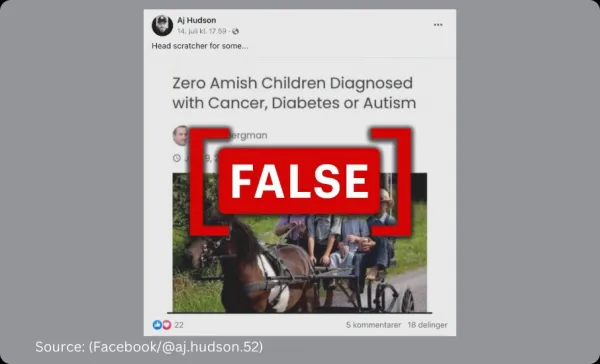By: Nikolaj Kristensen
July 18 2023

The Amish are not 100 percent unvaccinated, and chronic diseases and neurodevelopmental disorders, like autism, are present in the community.
Context
Posts on social media claim that not a single Amish child has been diagnosed with cancer, diabetes, or autism. Many of the posts include a screenshot of an article, published by Slay News on July 9, 2023, with the headline “Zero Amish Children Diagnosed with Cancer, Diabetes or Autism.”
The Amish are an Anabaptist Christian group in North America, known especially for rejecting technology and other conveniences of modern life. According to Slay News, they are also almost entirely unvaccinated.
The claims are based on a senate testimony from tech entrepreneur turned anti-vaccine activist Steve Kirsch. According to the Slay News article, “a new comprehensive study has found that no Amish children have been diagnosed with chronic conditions that impact the rest of America.” It states that Amish children are strictly 100 percent unvaccinated and rarely presented with any long-term diseases or lifelong disorders, including cancer, autism, heart disease and others. The study was allegedly presented by Steve Kirsch to the Pennsylvania State Senate.
But the claims are false. The Amish are not 100 percent unvaccinated, and chronic diseases and neurodevelopmental disorders exist within the community. Slay News is a known misinformation site with a history of publishing false and misleading articles.
In Fact
Kirsch did give testimony in a Pennsylvania State Senate hearing on June 9, 2023. Talking about vaccines and the Amish, he said, “The Amish are a perfect example of a large group of people who are largely unvaccinated. And there is no – we can’t find an autistic kid who was unvaccinated. It’s very, very rare. In the Amish community, very, very rare. You won’t find transsexuals, you won’t find homosexuals. You won’t find kids with ADD, with auto-immune disease, with PANDAS, PANS, with epilepsy. You just don’t find any of these chronic diseases in the Amish.”
However, as Steve Nolt, director of the Young Center for Anabaptist and Pietist Studies and professor of history and Anabaptist studies at Elizabethtown College, told Logically Facts, the claims are unfounded.
“It is true that in many Amish communities' rates of vaccination are lower than the population at large, but it is not true that typical chronic conditions barely exist among the Amish. The Amish are not, on the whole, an unhealthy population, but the claims made by Mr. Kirsch are without foundation,” he said.
Braxton Mitchell, a professor of medicine, epidemiology, and public health at the University of Maryland School of Medicine, who has studied the Lancaster Amish group for over 25 years, agreed. “Cancer and diabetes are uncommon in kids. Childhood diabetes is probably less common in Amish kids compared to non-Amish, and this is likely due to the very different lifestyles between Amish and non-Amish kids. Amish kids are much more physically active,” Mitchell told Logically Facts.
Although Mitchell was not certain of the exact figures, he was clear that “Autism does occur in the Amish. Bear in mind that autism (and ADD) are hard to diagnose and require expert clinical assessments – which the Amish may not seek out.” He added that although the Amish are not 100 percent unvaccinated, childhood vaccination rates tend to be lower.
The Verdict
In many Amish communities, vaccination rates are lower than the population at large, but the Amish are not 100 percent unvaccinated. It is not true that typical chronic conditions barely exist among the Amish. Childhood diabetes does exist among the Amish, although it is likely less common than in the general population due to Amish children being much more physically active. Autism and ADD are also present among the Amish but are infrequently diagnosed as these require specialist assessment that the Amish are unlikely to seek out. Therefore, we have marked this claim as false.
The COVID-19 pandemic has given rise to a lot of potentially dangerous misinformation. For reliable advice on COVID-19, including symptoms, prevention, and available treatment, please refer to the World Health Organization or your national healthcare authority.